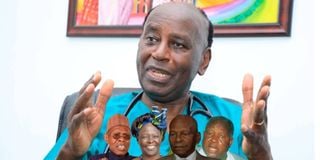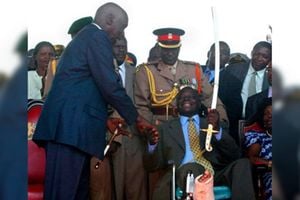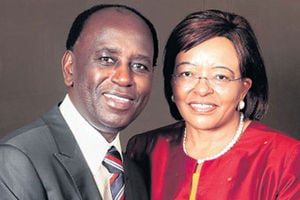
Dr Dan Gikonyo (background). He treated Koigi Wamwere (left), Prof Wangari Maathai, Charles Rubia and Kenneth Matiba.
A doctor who treated leaders beaten up or jailed for opposing President Daniel arap Moi’s regime has put his recollections in a book.
Dr Dan Gikonyo, a cardiologist, was in the team that attended to an unconscious Rev Timothy Njoya at Nairobi Hospital when the cleric was beaten senseless during protests in 1999.
He also treated Prof Wangari Maathai when she was assaulted by State agents in 1992, 1996 and 1999 when she sustained head injuries following an attack by gangs as she fought for Karura forest.
He attended to Koigi Wamwere who became sick in detention and was admitted to Nairobi Hospital in 1996.
Dr Gikonyo treated Kenneth Matiba and was among the first to learn in 1991 that the detainee was bleeding in the brain.
Another government critic that Dr Gikonyo treated was Charles Rubia, who developed lung problems while in detention.
According to Dr Gikonyo in his book Doctor at Heart, it took bravery for a doctor to attend to any of the anti-government voices.
“There was prevailing fear among doctors with regard to attending to people who were seen to be against the dreadful Moi administration,” the book says.
“The political climate was hostile, and colleague surgeons were a bit apprehensive of carrying out the surgery on the opposition hero (Rubia). ‘What if something goes wrong accidentally and he dies? People will say we were compromised by the state to eliminate him,’ one surgeon told me’,” writes Dr Gikonyo.

Dr Dan Gikonyo during the launch of his book titled ‘Doctor at Heart’ in Nairobi on September 23, 2024.
During the launch of the book on Wednesday, Dr Gikonyo said he was deliberate about siding with the anti-government brigade.
“I’ve always chosen to stand with the truth; to stand with honest people and to stand with what is right. It happened to be at a time people are choosing what is right, what is wrong, who is truthful, who is not. I chose the side of truth and the side of honour,” he writes.
“I attended to many heroes of the Second Liberation. When I went to see Rubia in detention, my friends were telling me I would not come back. But there comes a time we have to choose between honesty, truth and other sides of that coin.”
Dr Gikonyo was at the first Saba Saba rally in 1990 and later became a life member of the Democratic Party, whose chairman was Mwai Kibaki.
The fact that Dr Gikonyo does not hide from politics was praised by Mr Kiarie Kamau, the Chief Executive Officer of East African Educational Publishers, during the launch of the book.
“He is a bold political observer who does not shy away from what Kiraitu Murungi described as ‘the mud of politics’,” Mr Kiarie said.
Kisumu Governor Anyang Nyong’o, who wrote the foreword to the book, describes Dr Gikonyo as “the reluctant politician”.
“It is amazing that notwithstanding his strong views about politics, he never threw himself into electoral politics. Instead, he contributed his political ideas to the politics of his time by belonging, for example, to the Democratic Party...and joining forces with us in the broad national democratic front that liberated Kenyans from the discredited Moi regime in 2002,” Prof Nyong’o says in the foreword.
Doctor at Heart describes behind-the-scenes happenings as Dr Gikonyo interacted with his patients.
Unconscious
“We rushed to the emergency department of Nairobi Hospital to receive Rev Njoya when he was brought in unconscious. His pastoral shirt and collar were soaked in blood. One of his arms was broken. His blood pressure was low and he was in shock. He could not explain how he was feeling for us to be able to assess the extent of his injuries. He was on the verge of death,” he says.
Rev Njoya was at the book launch.
“We cut open his shirt with scissors before embarking on intravenous lines to stabilise his blood pressure. Then we carried out radiological and blood tests and moved him to the ICU. He is lucky to be alive.”
Dr Gikonyo says he had the “privilege of attending to Prof Maathai when she was assaulted by security agents. He describes the 1999 attack in Karura as “near-death”.
Regarding Mr Wamwere, Dr Gikonyo paints the picture of a mother who went all out to secure her son’s freedom.
“I met Koigi when he became sick while in detention and was later admitted to Nairobi Hospital in 1996. Confined to a room in Lady Macmillan Ward with over eight guards at every shift, he requested me to attend to him. I felt sad as I passed his mother, Monica Wangu Wamwere, who was pained by her son’s suffering and had vowed to camp at the hospital’s corridors where she sat and slept to pressure for justice for her son,” writes Dr Gikonyo.
The story of Monica Wamwere and her lobbying methods was the subject of the 2010 film, “The Unbroken Spirit”.
“I interviewed Koigi in his room. He was never allowed out except when using the bathroom. He, however, did his regular exercises in the small room. Every morning, he would jog on the spot for over one hour, sweat dripping down his dreadlocks. At one time, the guards raised concern about his physical fitness,” writes Dr Gikonyo, adding that he started sneaking letters from the detainee’s family.
The doctor kept some of those letters until 2023 when Mr Wamwere took them.
Dr Gikonyo started the process that saw the release of Mr Wamwere from detention on medical grounds.
“The state demanded a second opinion from Dr David Siverstein – best known for being President Moi’s physician. Koigi refused to be examined by any doctor selected by the state. I pleaded with him to oblige. ‘If you decline the examination, it may imply that my recommendation was not objective and honest,’ I told him, and he accepted. Dr Silverstein conducted his evaluation and came to the same conclusion,” he writes.
Matiba’s release from detention was announced in a 1 pm bulletin out of a desire by the Moi administration to save face. It had become clear that Matiba had been kept behind bars when seriously ill.
“He had suffered a stroke while in detention and taken three days for him to be brought to hospital,” writes Dr Gikonyo.
Matiba was evaluated by an expert who recommended that he be freed immediately. Dr Gikonyo took that report to the police.
“We did not wait for long. During the 1pm news bulletin that Sunday, it was announced that Matiba had been released from prison,” Dr Gikonyo states.
Rubia, another government critic, had also been freed via a 1 pm bulletin on Dr Gikonyo’s intervention. A growth had been detected in Rubia’s lung. Dr Gikonyo took the report to police and Rubia’s release was announced on the 1 pm bulletin.
Dr Gikonyo infuses some pride in his words when he says his reports “secured the release of Rubia, Matiba and Wamwere”.
He was based at Nairobi Hospital for 20 years before branching to Karen Hospital which he founded with his wife, Betty.








